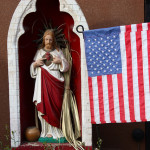We run our website the way we wished the whole internet worked: we provide high quality original content with no ads. We are funded solely by your direct support. Please consider supporting this project.

Conservatives and Liberals in the Same Kingdom
Jesus did not allow the world to set the terms for what he did. For instance, he called Matthew, a tax collector, as well as Simon, a zealot, to be his disciples. Tax collectors were on the farthest right wing of Jewish politics, zealots on the farthest left. In fact, zealots despised tax collectors even more than they despised the Romans, sometimes even assassinating them.
Yet Matthew and Simon spent three years together while following Jesus. In the accounts of Gospels, we never find a word about their different political opinions. Indeed, we never read a word about what Jesus thought about their radically different kingdom-of-the-world views.
This silence suggests that they had something in common that dwarfed their individual political differences. To be sure, Jesus’ life and teachings would undoubtedly transform the trust both had in their political views if they would allow it. At the very least, the tax collector would no longer cheat his clients—as they often did—and the zealot would no longer kill. Yet Jesus invited them to follow him as they were, prior to their transformation, and their widely divergent political views were never a point of contention.
What are we to make, then, of the fact that the church is largely divided along political lines? While Jesus never sided with any of the limited and divisive kingdom-of-the-world options of his day, the church today, by and large, swallows them hook, line, and sinker. Indeed, in some circles, whether conservative or liberal, taking particular public stands on social, ethical, and political issues, and siding with particular political or social ideologies, is the litmus test of one’s orthodoxy.
When this happens, it is evidence that the church is co-opted by the world. It means that we have lost our distinctive kingdom-of-God vision and abandoned our mission. It tells the world that we’ve allowed the world to define us, set our agenda, and define the terms of our engagement with it.
We must once again seek wisdom from above (James 3:17), the wisdom Jesus consistently displayed that will help us discern a unique kingdom-of-God approach to issues that will empower our moving beyond the stalemates and tit-for-tat conflicts that characterize the kingdom of the world.
We must embrace the simplicity of the kingdom of God. We must remember, if ever we were taught, the simple principle that the kingdom of God looks like Jesus and that our sole task as kingdom people is to mimic the love he revealed on Calvary. We have to a large degree gone AWOL on the kingdom of God, allowing it to be reduced to a religious version of the world. The world supplies the options, and in direct contradiction to Jesus’ example, we think it’s our job to pronounce which one God thinks is right.
But Jesus calls us and empowers us to follow his example by taking the more difficult, less obvious, much slower, and more painful road—the Calvary road. It is the road of self-sacrificial love. This changes everything, for both conservatives and for liberals.
—Adapted from The Myth of a Christian Nation, pages 62-65
Photo via VisualHunt
Related Reading

Christians Should…
The American Jesus blog recently posted a series of reflections from Christians arguing for different ways of voting including, Barack Obama, Mitt Romney, Jill Stein, as well as an argument for not voting. It’s a little bit disturbing that each post is titled “Why Christians Should…” as this reflects the way we confuse our mission in the…

Zombies
What would Halloween be without a post about zombies? Image by rachel a. k. Sourced via Flickr.

Sermon Clip: How Christians Should Respond to Ferguson
In this clip from this weeks sermon, Greg Boyd comments on how Christians should respond to the events in Ferguson St. Louis and how that response should always be in love and to help heal both sides. The full sermon is here: http://whchurch.org/sermons-media/sermon/heart-smart-qa

Love That Keeps On Giving
In English, we have one word for love. In ancient Greek, there were four different words that we can translate as “love.” And each has a different meaning. Let’s consider each briefly. Storge—referred to a person’s affection for something. When we say we love our car or a person’s smile or another’s ability to sing,…

Podcast: Is Pledging Allegiance to the Flag a Big Deal?
Greg discusses allegiances and pledges. http://traffic.libsyn.com/askgregboyd/Episode_0442.mp3

Cross-like Love and Non-Violence
Cosmo Spacely via Compfight Though it seems to have been forgotten by many today, the cross wasn’t simply something God did for us. According to the NT, it was also an example God calls us to follow. Hence, after John defined love by pointing us to Jesus’ death on the cross on our behalf, he…
